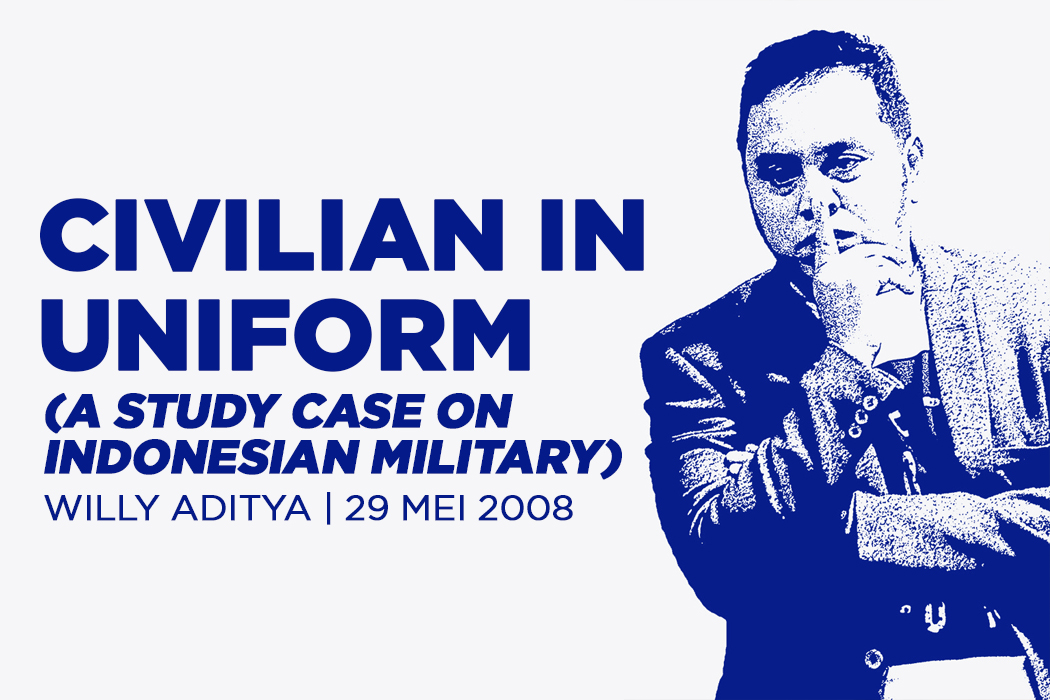
CIVILIAN IN UNIFORM (A STUDY CASE ON INDONESIAN MILITARY)
“As ‘citizens in uniform’, armed forces personnel, whether they be conscripts or volunteers, are entitled to the same human rights and fundamental freedoms as any other citizen,” Christian Strohal, Director of the OSCE’s Office for Democratic Institutions and Human Rights (ODIHR).
In carrying out their duties, soldiers may be called upon to face extreme dangers – even risking their own lives. It may therefore seem strange to talk about human rights in the context of the armed forces, when this most fundamental right – the right to life – is so often at stake. But although members of the armed forces have exceptional duties, they also have the same human rights and responsibilities as all other citizens.
Universal Declaration of Human Rights of 10th December 1948:
Art 1. [Liberty, Equality, Brotherhood] All human beings are born free and equal in dignity and rights. They are endowed with reason and conscience and should act towards one another in a spirit of brotherhood.
Art. 3 [Right to Life and Liberty] everyone has the right to life, liberty and security of person.
Art. 29 [Basic Duties] 1. Everyone has duties to the community in which alone the free and full development of his personality is possible.
And when the human rights of soldiers are protected within their own national armed forces, they are more likely to respect the rights of others – soldiers and civilians – both during peacetime and armed conflict.
In Germany, concept of Innere Führung Article 6 “Soldiers Act” of Germany, says a soldier enjoys civic rights as any other citizen. Within the necessities of military service his rights will be limited only by duties constituted by law.
Military life entails certain curtailment of the liberties of armed forces personnel in order to maintain discipline and be trained effectively for the hardships of military action. Such restrictions should, however, be of an exceptional nature, provided for by law, and applied consistently in a manner strictly proportionate to the aim of the law. These restrictions should also comply with treaty obligations.
In some armed forces, a lack of clarity over which rights can legitimately be curtailed, and the lack of a presumption in favour of upholding the rights and freedoms of military personnel means that those rights are sometimes abused within their own institutions. Typical form of abuse includes illegal punishments or requirement to carry out non-military services. New recruits and those low down in the military hierarchy are particularly vulnerable, so it is important to ensure respect for basic rights all the way up the chain of command. The same logic can be applied when the armed forces are in action: they must carry out their military duties in line with certain international standards, whatever their rank.
Post-Hitler Germany has specific experience in laying foundation of value of society (post-Hitler era) and virtue of military (The main strength or pillar in Germany during The Second World War under NAZI regime). The main dichotomy taking place in NAZI era experienced a transformative deconstruction as it was transformed into values of liberal democracy as a Mecca of world civilization. Neo Germany never undergoes any destruction of fascism ideological blue print machine and NAZI racism among military such as Innere Fuhrung. Nevertheless, the change undergone emphasizes on value structure and the institution content. Fascism ideological blue print machine was transformed into a transformative room focusing on social democracy and human rights. The political role of this institution has been maintained despite of a radical change from Nazi party commissariat political school to citizen and civil society political education. How dichotomy that delivers a special class in society (military class) becomes a joint value between society and military.
Relationship among Citizen, State and Military
Aristotle’s ideal on good society is manifested through a strict distinction between the polis (the public one) and oicos (the private one). Aristotle then landed his ideal in a foundation to strengthen the establishment of republic which—in Cicero term—is the most possible political alliance allowing a freedom protected by law. Not only confined to it, Aristotle view then has been vastly disseminated in a theory of concrete political ethic.
The common will in shaping a good society is only possible if leaders as well as citizens are united by the true nature to prioritize what he named as a virtue, a quality to prioritize ”the common good”. This, then, is Machiavellian ethical interpretation of Aristotle’s polis concept.
In more unique way, in Machiavellian, military is seen in citizenship frame. Military exists due to the necessity to maintain the ideal of public society defined by previous republic government. Therefore, patriotism in Machiavellian is not exclusively identical with military claim. Patriotism, originally, was a citizenship claim that then has been dispersed in more specific education mode into military. Therefore in this Machiavellian frame, state defense is the emphasis, yet, the highest state defense is not in military field, and it is in a struggle to defend the common good.
Germany Context
When the Federal Republic was founded in 1949, and during the ensuing years, public discussion of the re-creation of a German armed force was unavoidably shaped by the memories of wartime disaster and the terrible legacy of German militarism. For many Germans, even the thought of rearming the country was distasteful. Those citizens favoring the formation of new armed forces were convinced that these forces would have to represent a near-complete break with German military history. The consensus was that the military would require a constitutional basis for its existence, with the Bundeswehr unequivocally controlled by civilian authorities.
Military personnel do not give up their political status as citizens when they are in uniform. They continue to be members of the community from which they entered the service, as well as of the West German political community as a whole. They can run for office on local councils and for seats in the parliaments of the Länder and the Bundestag. Regulars and volunteers are permitted to join a military or civil service union and have the right of free expression, although by law they have obligation to exercise discipline and restraint in expressing their views publicly.
Components of Citizen in Uniform
o Political Authorities
Primacy of politics means that the armed forces answer to politicians who are responsible to parliament and that they are subject to special parliamentary control, a hierarchical order pervading all aspects of service and the principle of command and obedience. In their activities, service members are bound by justice and the law. Accordingly, all internal and external measures taken by the Head Quarter as part of the executive must be lawful and open to judicial review.
o Fundamental International Right
The Germany Basic Law which defines the purpose and mission of the armed forces, their status within the state, and the framework for the accomplishment of their mission. The basic values of our constitutional order are the dignity of man and liberty of the individual, and the rule of law governed by the principles of equality and justice. The state and its institutions are therefore under an obligation to:
preserve and protect the dignity of man,
promote personal responsibility on the part of the people and respect their free and lawful decisions guided by their conscience,
Restrict the liberty of the individual only where this is explicitly permitted by the Basic Law or the laws and regulations derived there from.
o Fundamentals of Political Education
In Germany armed forces Political or Civic Education is an element of our concept of leadership and civic education and contributes to the implementation of the system of values anchored in our constitution. Thus it has already existed for more than 50 years. The mission assigned to our armed forces requires the soldiers be acutely aware of the political dimension of judgements made and action taken by the military. Political and military responsibility is to mentally prepare the soldiers for upcoming tasks. They must acquire professionalism in performing these tasks, yet at the same time be able to see the political context in which they are set. Every soldier must know and understand what he is being trained for and, should he be committed to action, why. He should be convinced that his mission is politically necessary, militarily appropriate and morally justified. The foundations for this are laid in the civil and international law classes. Understanding the signification and necessity of the soldier´s duty is just as important for the operation readiness of the armed forces as are his military skills and knowledge.
o Military Leadership
The objectives and principles serve to derive demands on the course of action. Joint Service Publication (ZDv) 10/1 specifies ten selected areas of application that are closely interrelated, have a particular influence on the daily routine and make considerable demands on the leadership behavior of the superiors. These areas of application reveal that Innere Führung is a task to be accomplished by each soldier rather than an isolated field of training or special organizational element. In its capacity as a basic command and control principle it characterizes the entire service in the armed forces and represents – as you would say at private enterprise level – the “entrepreneurial culture” of the Bundeswehr.
Indonesia Context
The leadership of citizen in uniform has been reaffirmed by the penetration of military culture through its social-political role into civil life. In structure, ABRI was arranged in accordance of civil government structure, starting from Village (Teritory under Sub District) Supervision (Babinsa) at village level, Military Sub District Command (Koramil) at sub district level, Military District Command (Kodim) at District/Administrative City level, Military Resort Comand (Korem) at regency level, and Military Regional Command (Kodam) at province level.
This military structure attached to civil structure has been more cohesive with the existence of tri-party institutions such as Sub District Leaders Meeting (Muspika) encompassing sub district chief, Sectoral Police Chief (Kapolsek) and society figures. At the higher level, there are Regional Leaders Meeting (Muspida) at district and provincial level consisting of military regional unit, and police, regional chief and local parliamentary leader.
- The conference of citizens in uniform: protecting human rights in the armed forces, 21 September 2006
- Nina Nordberg, Office for Democratic Institutions and Human Rights (ODIHR )
- Willy Aditya, Value and Virtue of Indonesian Military, 2008
- Robertus Robet, Machiavelli dan Negara dalam “Bela Negara”, Konstelasi 5 December 2007
- www.photius.com/countries/germany/national_security/germany_national_security_citizens_in_uniform.
- Federal Ministry of Defense Bonn I hereby issue the Joint Service Regulation, 16 February 1993
- Leadership development and civil education centre, innere fuhrung
Kamis, 29 Mei 2008
